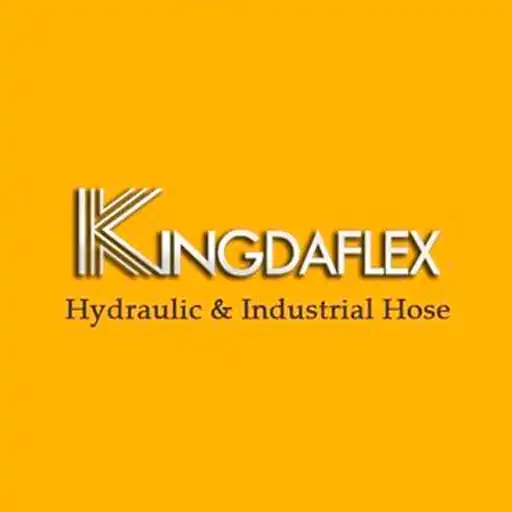Welcome to the world of LPG hoses, where safety and efficiency come together to ensure the smooth flow of liquefied petroleum gas (LPG).
In this detailed guide, we will delve into the intricacies of LPG hoses, covering their essential aspects, benefits, and maintenance.
Whether you’re a homeowner using LPG hose for heating or a professional in the gas industry, this article will provide valuable insights into what LPG hoses are and why they matter.
What Is LPG Hose?
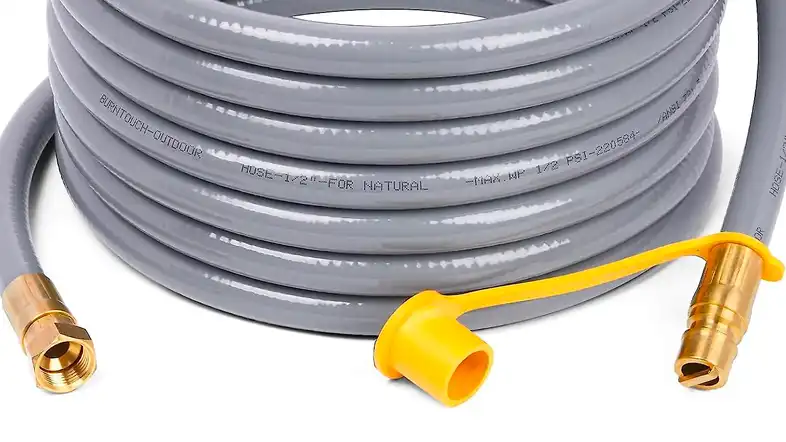
LPG hose, short for Liquefied Petroleum Gas hose, is a specialized conduit designed to transport LPG from its source to the point of use. These hoses play a pivotal role in a variety of applications, including residential heating, cooking, industrial processes, and automotive fuel systems.
Types of LPG Hoses
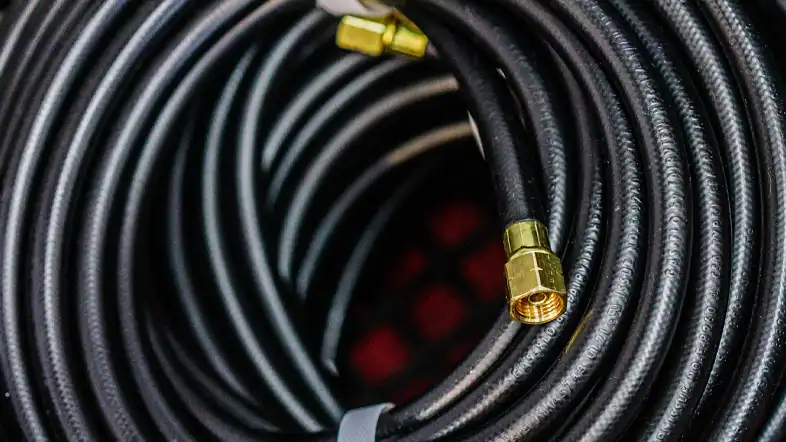
let’s delve deeper into the different types of LPG hoses and their unique characteristics:
Rubber LPG Hose:
- Material: These hoses are typically made of high-quality synthetic rubber.
- Flexibility: Rubber LPG hoses are known for their flexibility, which makes them easy to maneuver and install.
- Durability: They are durable and can withstand rough handling and outdoor conditions.
- Applications: Rubber hoses are commonly used in residential settings for connecting LPG cylinders to stoves, water heaters, and other appliances. They are also suitable for outdoor applications.
PVC LPG Hose:
- Material: PVC (Polyvinyl Chloride) is the primary material used for these hoses.
- Lightweight: PVC hoses are lightweight and easy to handle.
- Cost-Effective: They are cost-effective and often preferred for low-pressure LPG applications.
- Indoor Use: PVC hoses are commonly used indoors, such as in kitchens and small-scale commercial setups. They are not ideal for heavy-duty or outdoor use due to their lower pressure tolerance.
Stainless Steel LPG Hose:
- Material: These hoses are constructed with a stainless steel outer layer, making them highly resistant to corrosion.
- High-Pressure Handling: Stainless steel LPG hoses are designed to handle high-pressure LPG, making them suitable for industrial and commercial applications.
- Longevity: They have a longer lifespan compared to rubber or PVC hoses.
- Safety: Stainless steel hoses are preferred where safety is paramount, as they are less prone to leaks or damage.
Composite LPG Hose:
- Material: Composite hoses are a blend of different materials, often combining layers of rubber, plastic, and reinforcing fibers.
- Flexibility and Durability: These hoses offer a balance of flexibility and durability, making them suitable for various LPG transport applications.
- Versatility: Composite hoses can handle a range of pressures and are often used in situations where multiple hose types might be required.
- Applications: They are used in industries where flexibility, durability, and resistance to various chemicals are essential.
Choosing the right type of LPG hose depends on your specific needs and the application. Consider factors such as the required pressure rating, indoor or outdoor use, and resistance to environmental conditions. Always consult with professionals or refer to manufacturer guidelines to ensure you select the most appropriate LPG hose for your situation.
LPG Hose with Different Diameters
Here’s a table comparing the different sizes of LPG hoses:
| LPG Hose Size | Inside Diameter (Inches) | Outside Diameter (Inches) | Common Applications |
|---|---|---|---|
| 1/2 LPG Hose | 1/2 | Varies | Residential heating, small appliances |
| 1/4 LPG Hose | 1/4 | Varies | Barbecue grills, portable heaters |
| 3/4 LPG Hose | 3/4 | Varies | Residential heating, medium appliances |
| 3/8 LPG Hose | 3/8 | Varies | Industrial applications, medium-duty |
| 5/16 LPG Hose | 5/16 | Varies | Automotive LPG systems |
Please note that the outside diameter of these hoses can vary depending on the specific manufacturer and materials used. The choice of hose size should be based on the intended application and the required gas flow rate. Always consult with professionals or refer to manufacturer guidelines to select the right LPG hose size for your needs.
LPG Hose with Different Colors
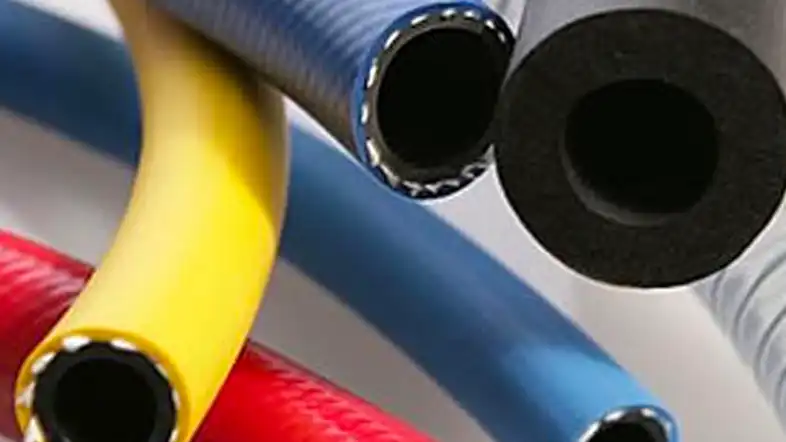
LPG hoses come in various colors, and these colors are not just for aesthetics; they often signify specific features or applications. Here’s a breakdown of LPG hose colors and what they typically represent:
Orange LPG Hose:
- Common Usage: Orange LPG hoses are among the most common. They are often used for standard LPG applications in residential settings, such as connecting gas cylinders to stoves, water heaters, or central heating systems.
- Safety Indication: The bright orange color serves as a safety feature, making the hose easily visible. It helps users and technicians identify LPG connections quickly.
Blue LPG Hose:
- Common Usage: Blue LPG hoses are typically used in outdoor or industrial settings where a high level of durability and weather resistance is required.
- Material Indication: The blue color may indicate that the hose is made of a material that can withstand harsh environmental conditions, such as UV rays, moisture, and extreme temperatures.
Yellow LPG Hose:
- Common Usage: Yellow LPG hoses are often used in construction sites and industrial settings. They are designed to handle heavy-duty applications and high-pressure LPG.
- High-Pressure Indicator: The yellow color can signify that the hose is suitable for high-pressure LPG systems, making it ideal for industrial use.
Green LPG Hose:
- Common Usage: Green LPG hoses are less common but are occasionally used in specific applications.
- Environmental Significance: The green color may indicate that the hose is environmentally friendly or designed for eco-conscious applications.
Black LPG Hose:
- Common Usage: Black LPG hoses are sometimes used in industrial settings where resistance to oil and chemicals is essential.
- Oil and Chemical Resistance: The black color can suggest that the hose is resistant to oils and chemicals, making it suitable for applications where these substances may come into contact with the hose.
Red LPG Hose:
- Common Usage: Red LPG hoses are not very common but may be used in certain specialized applications.
- Fire-Resistant: The red color may indicate that the hose has fire-resistant properties, which can be crucial in environments where fire safety is a top concern.
It’s important to note that while these color codes can provide useful information about the LPG hose, they may not be standardized across all manufacturers or regions. Therefore, it’s essential to check the manufacturer’s documentation and labeling to understand the specific characteristics and intended use of a particular LPG hose.
When choosing an LPG hose, consider factors such as pressure requirements, environmental conditions, and safety regulations in your area, in addition to the hose’s color, to ensure you select the right hose for your needs.
Importance of Using the Right LPG Hose
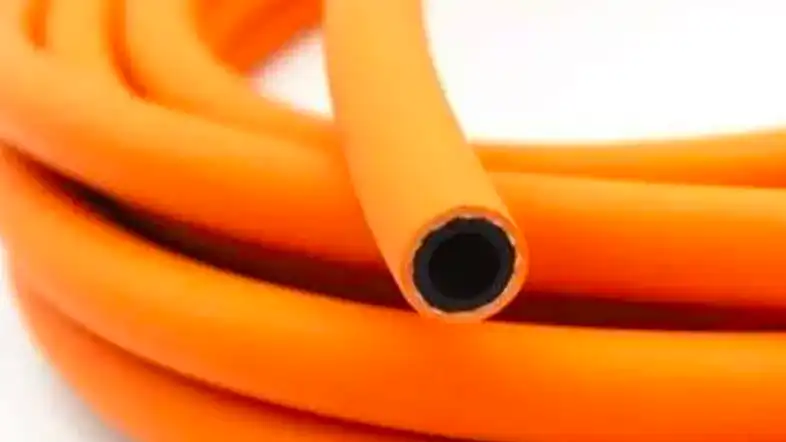
Let’s explore in more detail the importance of using the right LPG hose for your specific needs:
Safety First:
- One of the foremost reasons for using the correct LPG hose is safety. LPG is a highly flammable gas, and any leakage can lead to catastrophic accidents.
- Using the right hose designed for the intended application reduces the risk of gas leaks. For instance, hoses with the proper pressure rating and materials minimize the chances of ruptures or cracks.
Efficiency and Consistency:
- The right LPG hose ensures a consistent and controlled flow of gas. This is essential for maintaining the efficiency of gas-powered appliances and industrial processes.
- Inefficient or inconsistent gas flow can lead to wasted fuel, increased energy costs, and poor performance of appliances.
Versatility and Adaptability:
- Different LPG hoses are designed for various applications, from residential heating to industrial processes. Using the right hose ensures adaptability to your specific needs.
- Versatile hoses can handle a range of pressures and environmental conditions, making them suitable for diverse applications.
Durability and Longevity:
- Using a hose that matches your application’s demands in terms of materials and construction enhances durability and longevity.
- For instance, in harsh environments, such as industrial settings, stainless steel hoses are known for their resistance to corrosion and wear, ensuring a longer service life.
Cost-Effectiveness:
- While it’s important to select the right hose for the job, it’s equally important not to overspend on an unnecessarily high-grade hose for a low-pressure application.
- Choosing the appropriate hose not only ensures safety but also helps you avoid unnecessary expenses.
Compliance with Regulations:
- Different industries and regions may have regulations and safety standards governing the use of LPG hoses.
- Using the right hose that complies with these regulations is not only a safety requirement but also a legal obligation.
Environmental Considerations:
- Using the right hose can also have environmental benefits. For example, hoses designed to resist outdoor conditions can help prevent gas leaks into the environment, reducing greenhouse gas emissions.
In summary, using the right LPG hose is crucial for safety, efficiency, and overall effectiveness in any application involving liquefied petroleum gas. It’s not just a matter of practicality; it’s a fundamental element of responsible handling and utilization of this valuable energy source. Always consult with experts or refer to manufacturer recommendations to ensure you’re using the appropriate LPG hose for your situation.
Advantages of LPG Hoses
Using LPG hoses offers several advantages, including:
- Safety: LPG hoses are designed with safety in mind, minimizing the risk of gas leaks and accidents.
- Efficiency: These hoses ensure a consistent and controlled flow of LPG, optimizing energy usage.
- Versatility: LPG hoses are used in various applications, from heating homes to fueling vehicles.
- Durability: Depending on the type, LPG hoses can withstand different environmental conditions.
- Cost-Effectiveness: They are a cost-efficient way to transport LPG, reducing energy expenses.
Maintaining Your LPG Hose
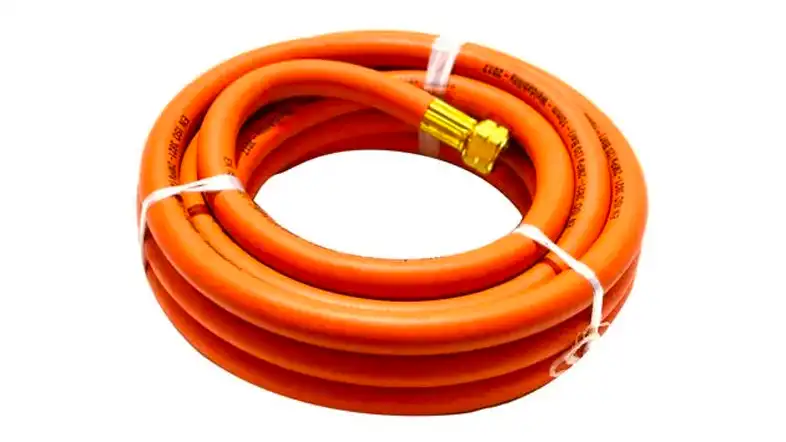
Proper maintenance is essential to ensure the longevity and safety of your LPG hose. Here are some maintenance tips to keep in mind:
- Regularly inspect the hose for wear and tear.
- Replace hoses that show signs of damage or aging.
- Store hoses away from direct sunlight and extreme temperatures.
- Use protective covers when hoses are exposed to harsh environments.
- Follow manufacturer recommendations for maintenance and replacement intervals.
FAQs
How often should I replace my LPG hose?
It’s recommended to replace your LPG hose every five years or sooner if you notice any damage.
Can I use a rubber LPG hose for my industrial application?
Rubber hoses are suitable for residential use. For industrial applications, consider stainless steel or composite hoses.
Are LPG hoses safe to use indoors?
Yes, LPG hoses are safe for indoor use when installed and maintained correctly.
Can I repair a damaged LPG hose myself?
No, it’s not advisable to repair a damaged LPG hose yourself. Always seek professional assistance.
What precautions should I take when using LPG hoses for my barbecue grill?
Ensure that the hose is in good condition, and check for leaks using a soapy water solution before each use.
Are there regulations regarding the use of LPG hoses in commercial kitchens?
Yes, there are regulations in place to ensure the safe use of LPG hoses in commercial kitchens. Consult local authorities for specific guidelines.
Conclusion
In conclusion, understanding what LPG hoses are and their significance is vital for anyone dealing with LPG in various capacities. These hoses are the lifeline of LPG transport, offering safety, efficiency, and versatility. By selecting the right type of hose and adhering to proper maintenance practices, you can ensure a seamless LPG experience. Stay safe, stay efficient, and enjoy the benefits of LPG with the right hose for your needs.

